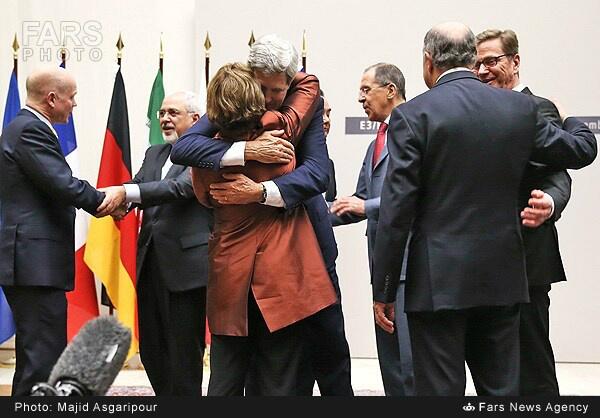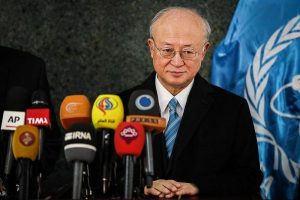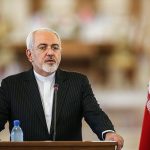by Peter Jenkins
The parties to the current negotiations with Iran over its nuclear program are being discreet about the details, as is sensible. Nonetheless, from the occasional statement or remark to journalists it is possible to form some impression of the issues that are causing the greatest difficulty.
These include restrictions on Iran’s capacity to enrich uranium during an interim period, the duration of that period, the phasing of sanctions relief, and, a late-comer to the agenda, restrictions on Iran’s ballistic missile program.
If, as the remarks imply, the gap between positions on such issues is still wide, it does not follow necessarily that the negotiating deadline of July 20 will be missed. It is all too common for negotiators to keep the most painful concessions in reserve until the 11th hour, in the hope that they will not be needed.
It will, however, be interesting to review some of the problems that have come to light and to imagine ways of handling them.
Duration of the interim period
Al Monitor’s Laura Rozen reported May 15 that an Iranian source said it is the Iranian team’s expectation that “after the signing of a comprehensive deal, there will be an interim period,” where there will be restrictions on Iran’s program “and the [possible military dimensions issue] will be resolved.”
But there has to be a “basis” for the duration of that interim period, according to the Iranian source. If the restrictions should last for 10, 15 or 20 years, the parties have to “examine” the basis. “Why 20 years?” he asked.
A solution to this problem would be to agree that the duration of the interim period will be determined by the International Atomic Energy Agency (IAEA), in the sense that it will be co-extensive with the time required by the Agency to affirm that there are no undeclared nuclear facilities or material in Iran and, in effect, that Iran’s nuclear program is as peaceful as that of any other Non-Nuclear-Weapon State (NNWS) party to the Nuclear Non-Proliferation Treaty (NPT).
The “basis” or rationale would be that requiring Iran to accept constraints on certain nuclear activities is logical for as long as it can reasonably be questioned whether Iran’s nuclear program is exclusively peaceful. Once the IAEA has found the same grounds for confidence in the peaceful nature of Iran’s program as exist in other NNWS, this rationale would no longer be logical.
A similar solution was proposed in January 2004, in relation to the duration of the suspension of uranium enrichment that had been agreed in Tehran on October 21, 2003. On that occasion it was rejected by Iran because Tehran hoped to be able to resume enrichment well before the Agency would be able to provide grounds for confidence — and rejected by the UK, France and Germany because they wanted the suspension to last indefinitely, if not forever.
Ten rather grim years later, can the parties bring themselves to accept this logic and bend it to the cause of an agreement?
The phasing of sanctions relief
Arash Karami reported May 21 that a spokesman for the Iranian Parliament’s National Security and Foreign Policy Committee told Iran’s Tasnim News that the P5+1 said after an agreement “we have to prove our goodwill. They will then remove sanctions one by one,” over a period of ten years.
It is not hard to imagine how unappealing such an offer must seem to an Iranian government that is banking on sanctions relief to improve the living standards of ordinary Iranians.
Iran will have understood long ago that the US administration will require many years to persuade Congress to repeal the nuclear-related sanctions that Congress has imposed. But Iran must surely be hoping that non-US and particularly EU firms will be free to trade and invest in Iran within months of agreement on a comprehensive solution.
“Iran would not mind front-loading the final deal,” another Iranian source told Rozen. “Iran would take all the measures [agreed] at the beginning of the deal, and expect its counterpart to do the same.”
It tends to be forgotten that when, on January 23, 2012, EU Ministers agreed to what Foreign Secretary William Hague described as an “unprecedented set of sanctions against Iran,” their aim was to coerce Iran into a nuclear negotiation.
“This is a major increase in the peaceful, legitimate pressure on Iran to negotiate over its nuclear program,” Hague told the House of Commons the next day.
If EU Ministers such as Hague are concerned about legitimacy, there is a chance that it would trouble their consciences to maintain such “unprecedented” (an euphemism for draconian) sanctions not just after Iran’s appearance at the negotiating table, but even after the conclusion of a comprehensive negotiation. And if legitimacy is not a concern, perhaps they can at least be persuaded to lift EU sanctions by all the EU firms that are hoping to resume normal business with Iran.
Iran’s ballistic missile program
“Iran also rejects that its ballistic missile program should be a subject for discussion with the P5+1, Iran’s negotiators have repeatedly said,” wrote Rozen May 21.
For their part, US negotiators have justified the inclusion of this issue on the agenda, despite the absence of any reference to it in the November 24 Joint Plan of Action (JPOA), by recalling the JPOA reference to “addressing the UN Security Resolutions” (the last of which, 1929 (2010), contains a brief missile-related provision).
As a justification this leaves a bit to be desired. The reference to UN resolutions is in the preamble of the JPOA, not in the final operative section, which itemizes the agenda for the current negotiation. It is uncommon to consider preambular wording as binding on the parties to an agreement.
Moreover, the relevant bit of operative paragraph 9 of resolution 1929 (2010) scarcely lends itself to the sort of restrictions that Israeli leaders and their Congressional supporters have been demanding that the administration obtain. It reads “[The Security Council] decides that Iran shall not undertake any activity related to ballistic missiles capable of delivering nuclear weapons, including launches…”
These words are clearly no basis for requiring Iran to surrender or destroy any of the ballistic missiles in its possession. At most they provide an opening for requesting that Iran refrain from testing some of its existing stock (those “capable of delivering nuclear weapons”), and from developing new models with that capability.
But even that request is contestable. Iran could deny that it possesses a nuclear weapons delivery capability. Since an internationally agreed definition of what constitutes that capability is lacking, and since that capability is contingent on being able to produce warheads of an appropriate diameter, US negotiators might end up wishing they had suggested, instead, a debate on how many angels can dance on the head of a pin.
Such objections might sound semantic; but the US, which has long relied on semantics to deny that Iran has a right to enrich uranium, would be ill-placed to jib at a dose of its own medicine.
It’s the Politics!
Speaking to the press on May 16, a senior US administration official said: “We’re focused on how all of the elements fit together to ensure Iran cannot obtain a nuclear weapon.”
It must be hoped that the senior official meant to say “will not”, and not, “cannot.” Indeed, if these negotiations are about denying Iran the capability to produce nuclear weapons, they are doomed to fail.
It is in the nature of nuclear weapon technology that once a state has passed a certain threshold, as Iran has, it can produce nuclear weapons, sooner or later, if it makes that decision. It is not axiomatic, however, that states will choose to do so.
On the contrary, since 1970 the evidence is that very few weapon-capable states want nuclear weapons; most recognize that their security is better served by backing the global nuclear non-proliferation regime.
This perception has been well articulated by Scott Kemp, a former adviser on nuclear non-proliferation at the State Department. In an interview with the MIT News office Kemp said, “We need to get past the idea that we can control the destiny of nations by regulating access to technology. International security must ultimately resort to the difficult business of politics.”
The current negotiation can succeed if the West’s goal is political: denying Iran a rational basis for wanting nuclear weapons. Since President Hassan Rouhani’s words and deeds suggest that he recognizes Iran will be more secure, and more prosperous, as a fully compliant NPT-state without nuclear weapons, this is a realistic goal.
Photo Credit: FARS News/Majid Asgaripour






I think the best course of action for Iran is to not continue the talks after July 20 and instead focus on increasing the number (and quality) of its centrifuges. After all, west does not show any realism in its demands as of yet and they might reconsider their position after facing with 100000 working machines of generation 2+
Farhang: My “rude” comments? I said the guy had a long and distinguished career. I just think he falls into the trap most long-term diplomats fall into which is a disconnect from the practical politics that are often at the heart of most disputes. In this case, it’s correct to say that Iran will never tolerate being at a strategic disadvantage to Israel vis-a-vis nuclear weapons with this current regime in place. Consequently, any deal negotiated with Iran that does not take into consideration that simple truth is incredibly short sighted.
As to the academic studies you cited, in each case, especially Mousavian’s work, the work was not done with access to intelligence sources, nor with access to the highest levels of Iranian decision makers and disregarded the public statements consistently uttered by Khamenei and previous ministers on this topic.
As to the issue of other neighboring states, I think you ignored the central argument I made which is Iran’s threat of weaponization and substantial military presences forces those countries to do a delicate balance of appearing friendly while securing US military guarantees. It’s not unlike the situation many of Russia’s neighbors are in during the Putin era.
As to the last point, again you’ve ignored the central fact. Khamenei does indeed have the final say. The fact that Ahmadinejad freely voiced both his and Khamenei’s opinions on Israel, nuclear weapons development and the US and Rouhani works hard to present a facade of division and moderation is pretty much pure theatre since Khamenei is the final voice.
The West won’t be able to give Iran a deal until it feels Iran acts according to established norms of international behavior. Brutal human rights actions and foreign adventures in Syria and Afghanistan and Iraq does not give the West confidence which is why it is incumbent on Iran to change and prove itself and not the other way around. Iran wants sanctions relief and as such has to earn it through deeds, not words.
tms5510: I’m assuming that means “too many stress” and 5510 either refers to the amount of anti-depressants you’ve taken so far or relates to digits in your cell phone in Iran since that’s the only way I can explain that last comment about centrifuges. Not helpful for advancing the debate for peace buddy!
Great piece. Perhaps sanctions relief could be accelerated, once Iran’s good faith was clearly shown.
@tms5510 – – You have an excellent proposal for ensuring no deal beteween P5+1 and Iran is achieved.